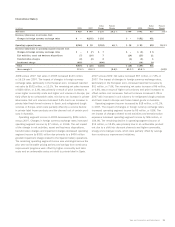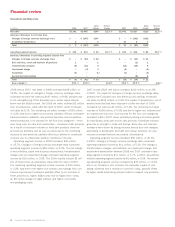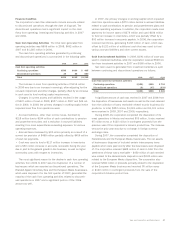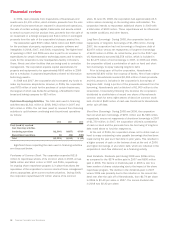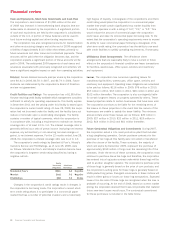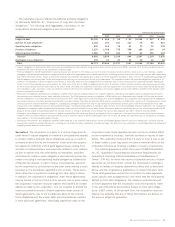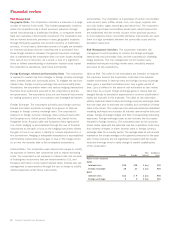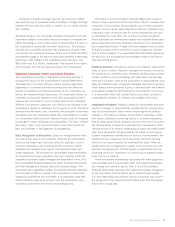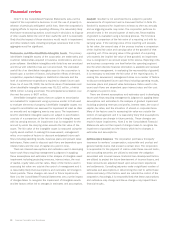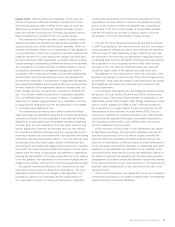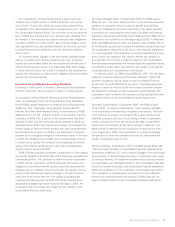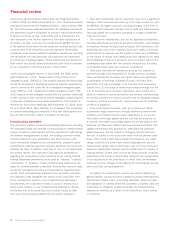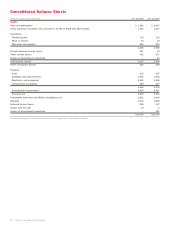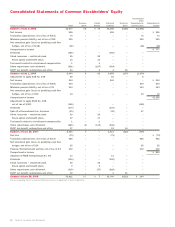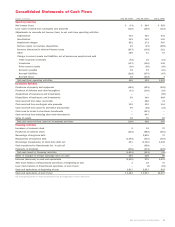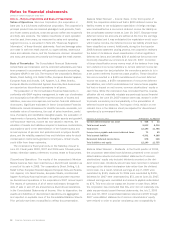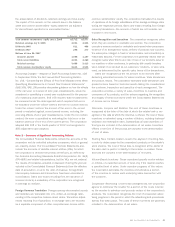Sara Lee 2008 Annual Report Download - page 37
Download and view the complete annual report
Please find page 37 of the 2008 Sara Lee annual report below. You can navigate through the pages in the report by either clicking on the pages listed below, or by using the keyword search tool below to find specific information within the annual report.Income Taxes Deferred taxes are recognized for the future tax
effects of temporary differences between financial and income
tax reporting using tax rates in effect for the years in which the
differences are expected to reverse. Federal and state income
taxes are provided on that portion of foreign subsidiaries income
that is expected to be remitted to the U.S. and be taxable.
The corporation’s effective tax rate is based on pretax income,
statutory tax rates and tax planning opportunities available in the
various jurisdictions in which the corporation operates. There are
inherent uncertainties related to the interpretation of tax regulations
in the jurisdictions in which the corporation transacts business. We
establish reserves for income taxes when, despite the belief that
our tax positions are fully supportable, we believe that our position
may be challenged and possibly disallowed by various tax authorities.
The corporation’s recorded estimates of liability related to income
tax positions are based on management’s judgments made in
consultation with outside tax and legal counsel, where appropriate,
and are based upon the expected outcome of proceedings with
worldwide tax authorities in consideration of applicable tax statutes
and related interpretations and precedents. We also provide interest
on these reserves at the appropriate statutory interest rates and
these charges are also included in the corporation’s effective tax
rate. The ultimate liability incurred by the corporation may differ
from its estimates based on a number of factors, including the
application of relevant legal precedent, the corporation’s success
in supporting its filing positions with tax authorities, and changes
to, or further interpretations of, law.
The corporation’s tax returns are routinely audited by federal,
state, and foreign tax authorities. Reserves for uncertain tax positions
represent a provision for the corporation’s best estimate of taxes
expected to be paid based upon all available evidence recognizing
that over time, as more information is known, these reserves may
require adjustment. Reserves are adjusted when (a) new informa-
tion indicates a different estimated reserve is appropriate; (b) the
corporation finalizes an examination with a tax authority, eliminating
uncertainty regarding tax positions taken; or (c) a tax authority does
not examine a tax year within a given statute of limitations, also
eliminating the uncertainty with regard to tax positions for a specific
tax period. The actual amounts settled with respect to these exami-
nations were the result of discussions and settlement negotiations
involving the interpretation of complex income tax laws in the context
of our fact patterns. Any adjustment to a tax reserve impacts the cor-
poration’s tax expense in the period in which the adjustment is made.
As a global commercial enterprise, the corporation’s tax rate
from period to period can be affected by many factors. The most
significant of these factors are changes in tax legislation, the
corporation’s global mix of earnings, the tax characteristics of
the corporation’s income, the timing and recognition of goodwill
impairments, acquisitions and dispositions, adjustments to the
corporation’s reserves related to uncertain tax positions and the
portion of the income of foreign subsidiaries that is expected to
be remitted to the U.S. and be taxable. It is reasonably possible
that the following items can have a material impact on income
tax expense, net income and liquidity in future periods:
•The spin off of the Hanesbrands business that was completed
in 2007 has resulted in, and may continue to result in, an increase
in the corporation’s effective tax rate in future years as the operations
that were spun off had, historically, a lower effective tax rate than
the remainder of the business and generated a significant amount
of operating cash flow. The elimination of this cash flow has required
the corporation to remit a greater portion of the future foreign
earnings to the U.S. than has historically been the case and
resulted in higher levels of tax expense and cash taxes paid.
•Tax legislation in the jurisdictions in which the corporation does
business may change in future periods. While such changes cannot
be predicted, if they occur, the impact on the corporation’s tax assets
and obligations will need to be measured and recognized in the
financial statements.
•The corporation has ongoing U.S. and foreign tax audits for various
tax periods. The U.S. federal tax years from 2005 onward remain
subject to audit. Fiscal years remaining open to examination in the
Netherlands include 2003 forward. Other foreign jurisdictions remain
open to audits ranging from 1999 to 2007. With few exceptions,
the corporation is no longer subject to state and local income tax
examinations by tax authorities for years before 2003. The tax
reserves for uncertain tax positions recorded in the financial state-
ments reflect the expected finalization of worldwide examinations.
The corporation believes that it has sufficient cash resources to
fund the settlement of these audits.
Audit outcomes and the timing of audit settlements are subject
to significant uncertainty. The corporation estimates reserves for
uncertain tax positions, but is not able to control or predict the
extent to which tax authorities will examine specific periods, the
outcome of examinations, or the time period in which examinations
will be conducted and finalized. Favorable or unfavorable past audit
experience in any particular tax jurisdiction is not indicative of the
outcome of future examinations by those tax authorities. Based on
the nature of uncertain tax positions and the examination process,
management is not able to predict the potential outcome with respect
to tax periods that have not yet been examined or the impact of any
potential reserve adjustments on the corporation’s tax rate or net
earnings trends.
•Facts and circumstances may change that cause the corporation
to revise the conclusions on its ability to realize certain net operating
losses and other deferred tax attributes.
Sara Lee Corporation and Subsidiaries 35


